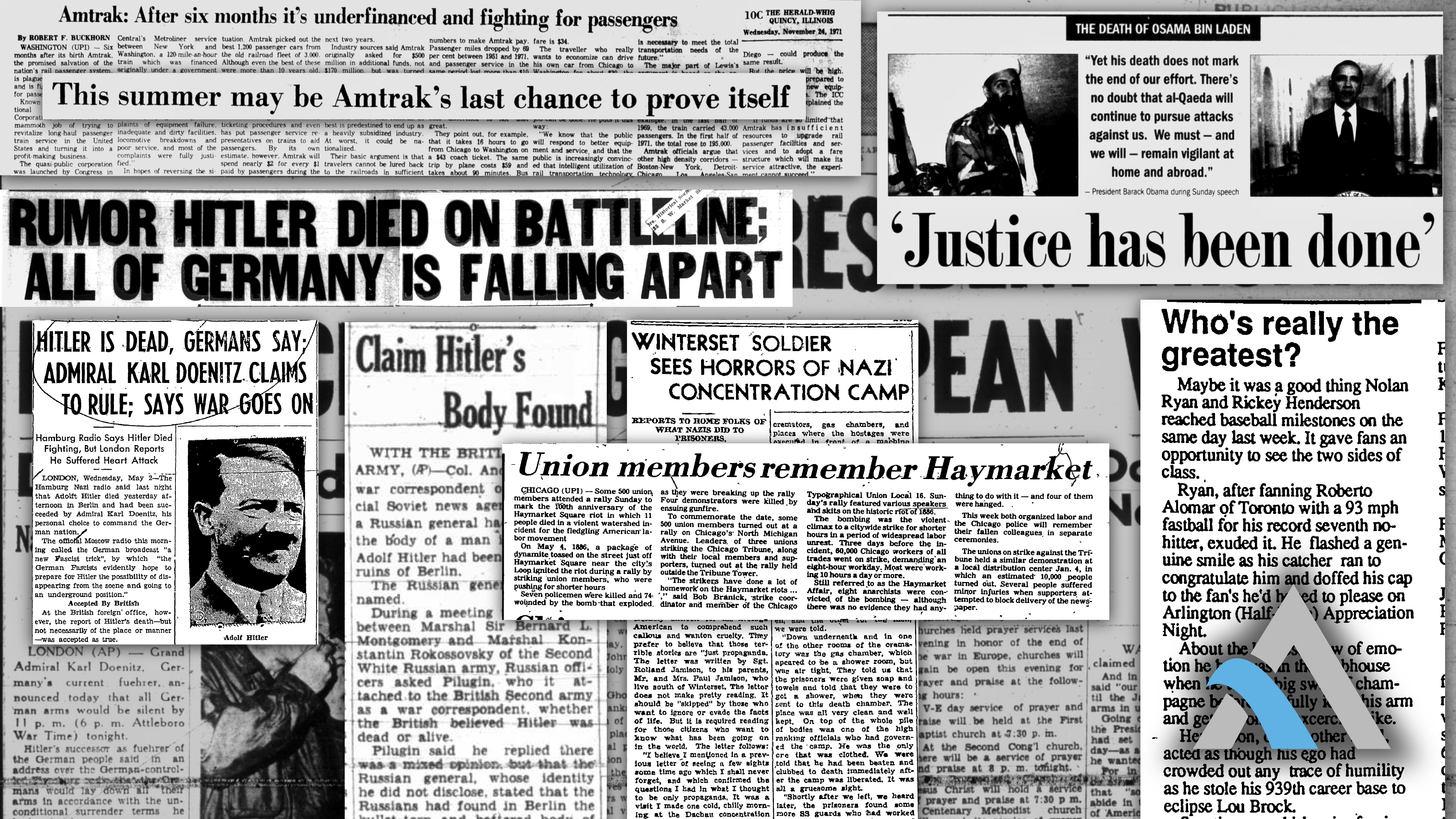This week in history was marked by destruction and change. Two hateful leaders passed away, unfair treatment sparked riots that destroyed many communities, and a baseball legend broke a record but was met with criticism for his attitude. Additionally, World War II was winding down on one front. If you’re interested in any of these events, this is the week for you! We will present this week’s historical events in a new format that will highlight the history more while still providing search tips.
(2000s – Present) “Justice Has Been Done”: Osama bin Laden Killed, 2011
The September 11th attacks are one of the darkest moments in American history, but they also united America in a way that it had never been before. Because of this, The United States launched a search for Osama bin Laden, the leader of the terrorist organization behind the attacks. On May 2nd, 2011, bin Laden was hiding in a compound in northern Pakistan when American forces raided the facility. Under orders from President Barack Obama, they shot and killed Osama bin Laden.
Osama bin Laden was one of the world’s most hated terrorists. He was hated so much that his death was celebrated. In the Quincy Herald-Whig published in Quincy Illinois on May 2nd, 2011, they printed a picture on the front page of a crowd celebrating outside the white house following the announcement of his death. President Obama when speaking about it said that “justice has been done” in killing bin Laden.
(1980s – 2000s) Robbery at the Ballpark: Rickey Henderson Breaks Stolen Base Record, 1991
Rickey Henderson is yet another baseball legend. During his Major League Baseball (MLB) career, he played for 10 different teams, some of them for multiple tenures. He started at Oakland Athletics and played there for a total of four separate tenures. He has impressive stats, including 297 home runs and 1,406 stolen bases in his MLB Career. Some of his awards include two World Series wins, the Gold Glove award, induction into the Baseball Hall of Fame, and having his number retired by Oakland Athletics.
On May 1, 1911, Rickey Henderson stole his 939th base breaking the previous record set by Lou Brock. When he broke this record, he was playing for Oakland for the second time in his career. This was just one of many records that Henderson broke during his baseball career, including the world record for stolen bases, which he broke in July of that same season.
Some criticized Henderson for being too cocky. On page 7 of The Mount Pleasant News, published in Mount Pleasant Iowa on May 10th, 1991, Sports Editor Phill Ross did exactly that. He compared Henderson to Nolan Ryan, a pitcher for the Texas Rangers who had also broken a record on that day. Ross argued that it was two sides of a coin; Ryan was humble about his talent, whereas Henderson was not. However, I think it goes without saying that Rickey Henderson was incredibly skilled at his sport.
(1945 – 1980s) Full Steam Ahead: Amtrak Begins Service, 1971
In 1970, the United States passed the Rail Passenger Service Act, creating a tax-funded passenger train organization. This organization would become Amtrak. Amtrak operates nearly all intercity passenger trains that are found in the United States. On May 1st, 1971, they officially began operation in 43 states with 21 routes.
The story of Amtrak is not free of struggle. For the months and years following its operation, it was predicted to fail. I was able to find several articles sharing this sentiment in the archives of the Quincy Public Library in Quincy, Illinois. On page 28 of the Quincy Herald Whig, published on November 24th, 1971, they reported that the project was severely underfunded and that the mission was “staggering, maybe even impossible” to succeed. This was at just the 6-month mark. Then, on page 46 of the Quincy Herald Whig, published on April 30, 1972, they said that during its second summer it would have to redeem itself, otherwise it would likely be shut down. There was not a lot of faith in the success of Amtrak.
However, Amtrak went from the little train that could to the biggest passenger train organization in the United States. It still operates to this day and has expanded to 46 states and more than 30 routes. Next time you take a passenger train, remember the start of it years ago from this very week.
(1914 – 1945) The End of Hitler’s Regime: Dachau Liberation and Hitler’s Death, 1945
Dachau Concentration Camp was the longest-operating concentration camp in Germany during World War II. It was in operation for twelve years and housed thousands of prisoners. The prisoners at Dachau were subjected to inhumane medical experiments and intense forced labor. Thousands of people died in this camp from various ailments and execution methods.
On April 26th, 1945, American forces began to approach the camp and the Germans panicked. There were 67,665 registered prisoners on that day, most of which were political prisoners or Jews. In the days leading up to liberation, the Germans began to transport and force march prisoners to other locations. The march is described as a “death march”, where they would kill anyone who didn’t keep moving.
On April 29th, 1945, American Troops reached Dachau. The units credited for liberating the camp are the 42nd Infantry Division, the 45th Infantry Division, and the 20th Armored Division. As they arrived, they discovered 30 train cars full of corpses in various states of decay. The sights the troops saw were nothing short of horrific. American forces liberated the prisoners who remained at Dachau and liberated those who were relocated soon after. This was one of many liberations that tore Hitler’s regime apart piece by piece as he lost control of Germany.
In the archives, I found a lot of interviews of soldiers who witnessed the camps firsthand. One was from the Cedar Valley Daily Times, which is housed in the Benton County CHA. They published on May 5th, 1945 that the “horror camps” had been liberated. Another piece I found in Winterset Iowa’s Winterset Madsonian, featured an interview from a soldier about what he saw at Dachau.
The next day, April 30th, Hitler committed suicide. Hitler was hiding in his underground bunker in Berlin, being hunted by Soviet forces who were storming Berlin. As the battle of Berlin continued, he realized that he was not going to win the war. He made the decision to end his life rather than wait for someone to find him. Alongside his wife, who took cyanide, he shot himself. Both of their bodies were then burned, as Hitler had instructed them to do, having seen what was done to Mussolini’s corpse. The death of Hitler finalized the end of his regime and wrapped up the war on one front.
Reports of his death were varied. At one point, many papers claimed that his body had been found, which we know isn’t true because his body was burned. On May 8th, the Attleboro Sun reported that Hitler’s body had been found. In the archives of South Oregon University, I found in The Ashland Daily Tidings published on May 1st, 1945, that he reportedly died on the battlefield. One thing I found interesting was that they referred to Hitler as a “little man with hate and death in his heart” which I would say is pretty accurate. The Mineral Daily News Tribune in Keyser, West Virginia published on May 2nd, 1945 that he died of a heart attack, providing another conflicting report. The news of his death shocked the world but also was misconstrued many times before his suicide was confirmed.
(1824 – 1914) A Time of Civil Unrest: Memphis and Haymarket Riots/Massacres, 1866 and 1886
The spring of 1866 was a time of civil unrest around the United States. Between racial persecution and unfair labor, many Americans were on edge and fed up. This tension ignited many riots throughout the country during the late 19th century.
Memphis Tennessee on May 1st, 1866, a 3-day riot/massacre began. What started as a white officer attempting to arrest a black veteran, followed by a group of black Americans trying to intervene, resulted in 3 days of shooting and massacre. White mobs destroyed black neighborhoods, killed black veterans and soldiers, and burned down many buildings. Police didn’t intervene, and instead took part in the destruction. On the second day of the riots, the city’s mayor declined any state or federal intervention. On the third day, martial law was enacted and troops came to restore the peace. The black community in Memphis was left in the wreckage, losing almost 50 lives, and hundreds left injured or robbed.
Twenty years later, another similar riot happened in the Midwest. On May 4th, an organized rally in Haymarket Square protesting the deaths of Chicago labor workers turned violent. That night, there were over 2000 protesters in the square. When the police arrived to break up the crowd, an unknown individual threw a bomb at them. The police reacted with open fire, and chaos erupted. At least 8 individuals died as a result, 7 of which were police officers and the other a protester. I found a piece from the 100th anniversary of the event in the Moline Daily Dispatch posted on May 5th, 1986.
This is where my search tip of the week comes in. When looking for pieces covering these events, I had to keep many things in mind. First, you have to think about where the event would have been reported, not just where it happened. This is why I looked in Moline, Illinois instead of trying to look in Chicago.
Second, it’s important to always look at dates past when the event happened. There are two different reasons for this. First, especially further back in the past, many newspapers weren’t published daily. Sometimes they were only published once a week! Make sure you account for the time difference between when it happened and when it was reported when looking for articles. Second, don’t be afraid to look for pieces from years after the event. With the Haymarket piece I found, the article came years after because it was about union workers remembering the anniversary of Haymarket. Sometimes, looking further outside the time when it happened can provide numerous extra results you may not have expected.
I hope these search tips can help you with your research and exploration of the Community History Archives. I encourage you to look into anything you find interesting because there is always something you haven’t seen before! Join me again next week to discover more of history’s hidden gems and timeless tales.


